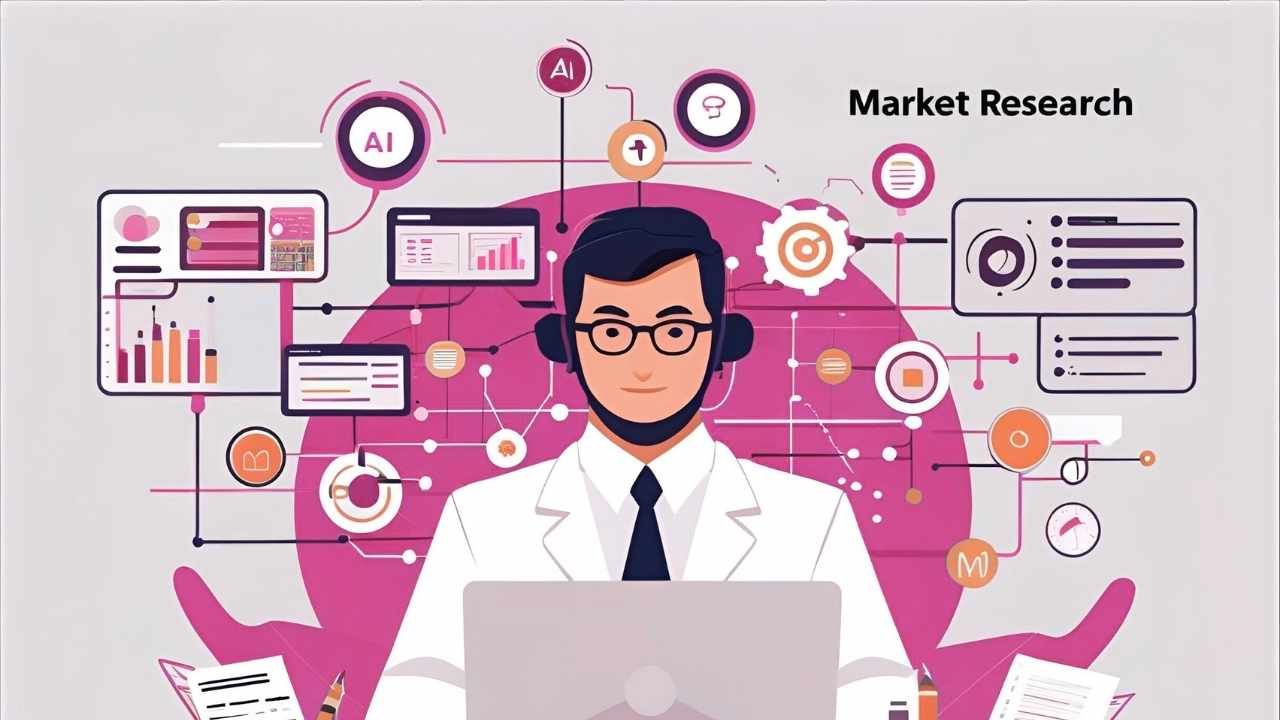Artificial intelligence technologies have revolutionized the terrain of market research. There is an increased use of AI in market research by modern businesses, which allows having a more thorough understanding of consumer behavior, forecasting market patterns, and data-informed decision-making. They are smart platforms that are transforming the way organizations can collect, analyze, and interpret their market data; such tools provide the fastest and most accurate means to do research.
The use of AI-powered research tools has become mandatory in the world of companies to gain competitive advantages in the modern digital market, where everything evolves at high speed.
What is Market Research?
Market research can be defined as the organized technique of accumulating, appraising, and understanding facts relating to the target markets, consumers, and rivals to make business judgments. It is one of the most important business functions that entail gathering information using diverse approaches such as surveys, interviews, focus groups, and observational studies.
The market research industry has changed tremendously with the advent of technology, and in this case, the use of AI for market research tools that automate lengthy methodologies in market research software. Such smart systems can analyze huge piles of unstructured data, find patterns, and convert them to actionable insights within a time frame that is shorter than traditional techniques.
Today, market research incorporates both quantitative and qualitative study approaches with the support of artificial intelligence that improves the accuracy and decreases human bias in data analysis.
Why AI For Market Research is Important
Market research using AI is an essential requirement for contemporary companies in order to retain competitive advantages in their fast-maturing markets. Such smart solutions overcome the existing drawbacks of traditional research and offer improved possibilities for data processing and analysis.
- Speed: AI-driven research solutions allow processing large amounts of information much faster (minutes instead of weeks) than conventional means and help make decisions in real-time and deploy rapid responsiveness strategies in the marketplace.
- Accuracy: Machine learning algorithms eradicate human bias and error, giving more performance insight through the uniformity of analytical approach and pattern identification abilities.
- Cost-effective: Automated processes of research contribute to substantial savings of operational costs via minimized levels and needs of manual labor, the highest level of output quality, and the widest scope of research.
- Scalability AI systems are capable of analyzing several sources of data at once and processing a growing number of research volumes with equal input of resources and without any compromise to quality.
- Predictive abilities: Proactive business decisions can be achieved because of advanced algorithms that have the ability to predict market trends and consumer behaviors.
Essential Features to Look for in AI For Market Research
Choosing an appropriate market research platform involving AI will require a thorough consideration of the defining features that can best match your research and business needs and challenges.
- Automation: The company offered complete data collection, report generation by automating comprehensive workflows so that minimal manual and manual work is required, and research timelines are also quickened several times.
- Integration: The capability to connect with the existing business systems, CRM, and data sources seamlessly to form integrated research ecosystems and to make operations more streamlined.
- Analytics– Complex analytical systems like sentiment analysis, predictive modeling, and pattern detection to infer meaningful data out of complex data effectively.
- Visualization: Ability to configure reporting and interactive dashboards that can present raw data into fascinating visual narratives to accommodate presentation to stakeholders and be used in making decisions.
- Scalability: Flexible design that will allow it to accommodate a growing research demand and the simultaneous execution of numerous projects and a growing volume of data without sacrificing performance or being limited by it.
Comparison Table for AI For Market Research
| Platform | Rating | Best Feature |
| Speak | 4.8/5 | Automated Audio/Video Analysis |
| Pecan | 4.7/5 | Predictive Analytics Engine |
| quantilope | 4.6/5 | AI Co-pilot (Quinn) |
| Brainsuite | 4.5/5 | Creative Asset Testing |
| Brandwatch | 4.4/5 | Social Media Monitoring |
| Glimpse | 4.3/5 | Trend Identification |
| Hotjar | 4.2/5 | User Experience Analytics |
| Crayon | 4.1/5 | Competitive Intelligence |
| Browse AI | 4.0/5 | Web Data Extraction |
| Appen | 3.9/5 | Data Annotation Services |
10 Best AI For Market Research
1. Speak
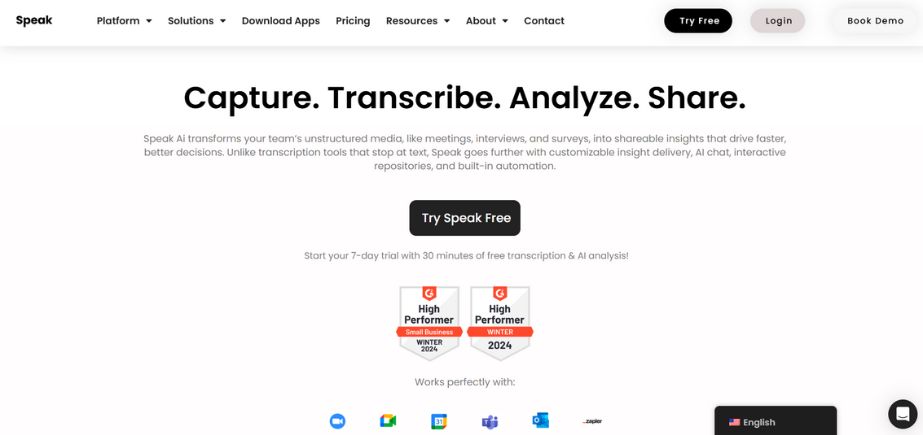
Rating: 4.8/5
Website: https://speakai.co/
Best Use Cases: Converting audio/video feedback into actionable consumer insights
Speak is the first tool to revolutionise qualitative research to analyse unstructured audio and video content to a comprehensive data insight using advanced natural language processing. It is useful in analyzing consumer interviews, focus groups, podcasts, and digital recordings, so it is an invaluable addition to a research team that has to handle multimedia files.
The competitive advantage of the platform is its processing power for bulk uploading and convenient integration across platforms with widely used video tools such as Zoom or YouTube. The automated feature of transcription, coupled with the Magic Prompts feature, reduces the amount of time spent processing the research methodology, as Speak enables the researcher to forego the analysis of the data and concentrate on the interpretation.
Key Features:
- Automated transcription tools
- Magic Prompts system
- Bulk file analysis
- Video platform integrations
- Natural language processing
Pros:
- Excellent transcription accuracy
- User-friendly interface design
- Multiple integration options
Cons:
- Limited quantitative features
- Higher pricing tiers
- Requires internet connectivity
Pricing: Custom pricing based on usage volume and feature requirements
2. Pecan
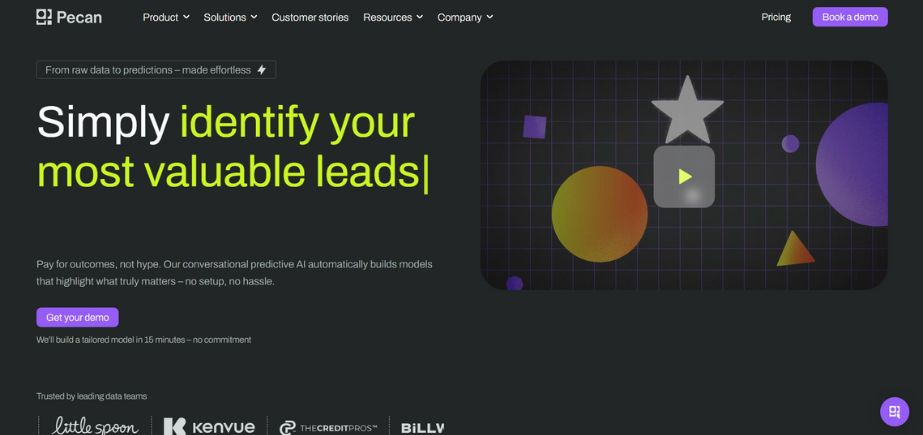
Rating: 4.7/5
Website: https://www.pecan.ai/
Best Use Cases: Predictive analytics and customer behavior forecasting
Pecan is one of the most popular predictive analytics platforms that with the help of the latest machine learning algorithms, transforms the available datasets into the ones that could be forecasted by the business. The platform is efficient in providing answers to the complex corporate questions of customer retention, demand forecasting and campaign enhancement through imported data warrants of heterogeneous origins.
Pecan is competent enough to connect more with other common business tools like Salesforce, Oracle as well as Amazon S3 which is useful in the importation of data. It is also reinforced by the straightforward nature of its predictive analysis and question-based insights on the business as well as in daily predictions with scheduling in regular period analysis.
Key Features:
- Machine learning predictions
- Data integration capabilities
- Security protocol compliance
- Recurring analysis scheduling
- Business question processing
Pros:
- Highly accurate predictions
- Strong security measures
- Easy data integration
Cons:
- Requires existing datasets
- Complex setup process
- Limited real-time analysis
Pricing: Enterprise-level pricing with custom quotes based on data volume and complexity
3. Quantilopee
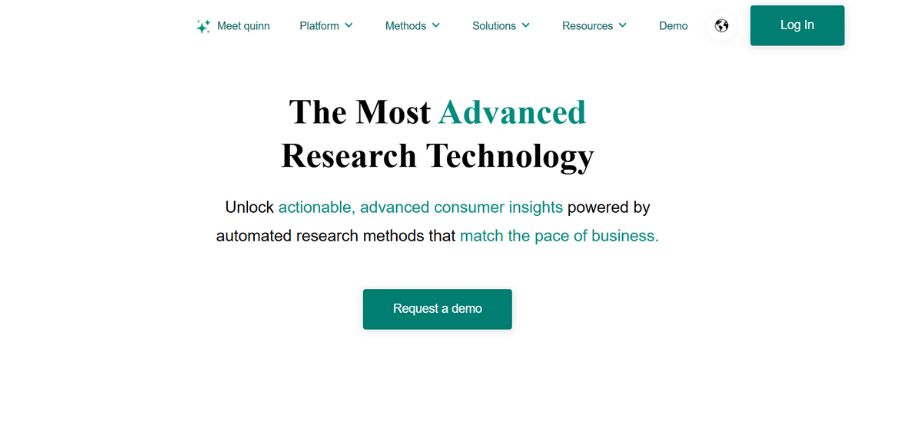
Rating: 4.6/5
Website: https://www.quantilope.com/
Best Use Cases: End-to-end survey research with advanced methodology automationQuantilopee is a broad-based research platform that combines artificial intelligence as its core and provides researchers with an end-to-end capability regarding survey-based research.
The crown Jewel of the platform is Quinn, an AI (artificial intelligence) co-pilot offering guidance on every aspect of the research process, setting up the survey, insight generation, and everything in between. The analytical process lies in the fact that the Quantilope has more than 15 fully automated advanced research methods presented, which address the lack of REQ proximity and, with the help of real-time data tracking, eliminate most of the routine and mindless work that is dragged in by the traditional research methods.
The ease of setting up an automated survey, the prediction of LOI, and the use of charts enables the researcher to apply their time to the strategic rather than operational matters. Another layer of the platform is offered by including the inColor video qualitative research option.
Key Features:
- Quinn AI co-pilot
- Automated survey templates
- Advanced research methods
- Real-time data monitoring
- Emotion sentiment analysis
Pros:
- Comprehensive research suite
- Intelligent automation features
- User-friendly interface
Cons:
- Steep learning curve
- Premium pricing structure
- Limited customization options
Pricing: Subscription-based pricing with multiple tiers based on research volume and features
4. Brainsuite
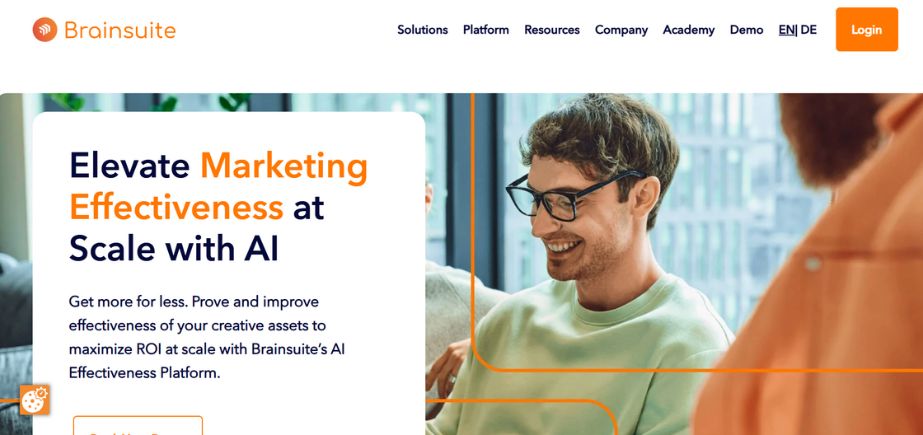
Rating: 4.5/5
Website: https://getbrainsuite.com/
Best Use Cases: Creative asset testing and marketing effectiveness measurement
Brainsuite complements this topicality of AI market research in that it specializes in application in marketing effectiveness and creative asset optimization. The platform is based on such experience of the founders, as neuroscientists, psychologists, and marketing specialists who combine academic research and real marketing solutions.
The platform uses more than one hundred AI models educated on the elements of more than one billion data points to foresee consumer reactions to many forms of marketing, such as recordings and packaging architectures on the one hand and social-media publications on the other hand. Such an invaluable benefit of performance measurement is offered by the competitive benchmarking feature of Brainsuite, which is backed by 2.5 million tested creative assets.
Real-time recommendation system by the platform converts insights into intelligent recommendations, and thus it is especially helpful to marketing teams who are interested in improving campaign efficiency.
Key Features:
- Predictive consumer response
- Creative asset benchmarking
- Real-time recommendations
- Competitive analysis tools
- Marketing effectiveness measurement
Pros:
- Scientific research foundation
- Comprehensive benchmarking database
- Actionable recommendations system
Cons:
- Specialized focus area
- Complex interpretation requirements
- Higher implementation costs
Pricing: Custom enterprise pricing based on testing volume and feature access
5. Brandwatch
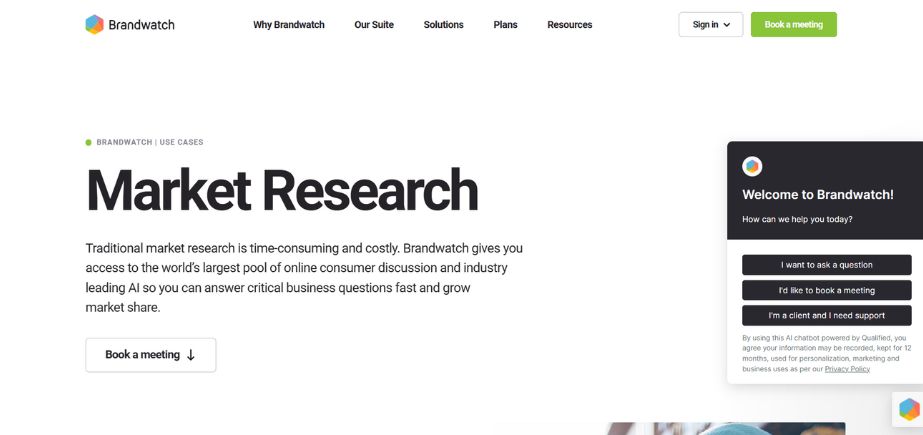
Rating: 4.4/5
Website: https://www.brandwatch.com/use-cases/market-research/
Best Use Cases: Social media monitoring and brand sentiment analysis
Brandwatch is among the most effective social listening technologies that are leveraged in establishing social media presence that relies on artificial intelligence to track progress on different platforms. This allows businesses to understand in real time how their brands are being perceived and what the market is thinking, as the AI analyst present on the platform automatically compiles social media posts, comments, mentions, and discussions.
In addition to text analysis, Brandwatch can also recognize objects, scenes, and logos in visualized content, providing an overall view of brand visibility online. Normally, the auto-segmentation technology on the platform applies machine learning to auto-label datasets without manual intervention, and the search engine, powered by AI and machine learning, transforms the way data can be discovered instantly by selecting the exact mention of a brand or conversation in large volumes of data.
Key Features:
- AI-powered social listening
- Image recognition analysis
- Automatic data segmentation
- Real-time monitoring alerts
- Advanced search capabilities
Pros:
- Comprehensive social coverage
- Advanced image analysis
- Real-time monitoring capabilities
Cons:
- Complex dashboard navigation
- Steep learning curve
- Premium pricing structure
Pricing: Tiered subscription plans starting from professional to enterprise levels
6. Glimpse
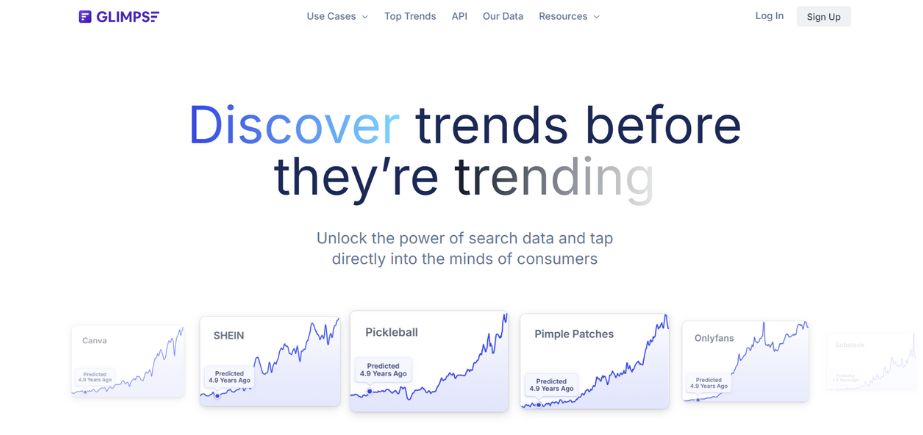
Rating: 4.3/5
Website: https://meetglimpse.com/
Best Use Cases: Emerging trend identification and market opportunity discovery
Glimpse can be seen as a futuristic AI-based market research platform that focuses on upcoming trends before they become the new normal. The platform uses the data of a wide range of sources, such as search patterns, social media chatter, online reviews, and e-commerce platforms, to identify initial market indicators. Such a holistic approach also allows companies to find and recognize product or service opportunities at the early stages and gives large competitive advantages.
The dashboard feature of Glimpse provides an advanced level of data visualization, which enables users to examine trends and filter work by demographics and other factors. The sentiment analysis component, coupled with Trendd, gives the business an idea of not only the emerging trends but also he level of emotional response to the trends among the consumer body.
Key Features:
- Multi-source trend analysis
- Interactive data visualization
- Sentiment analysis integration
- Demographic filtering options
- Early signal detection
Pros:
- Predictive trend identification
- User-friendly dashboards
- Comprehensive data sources
Cons:
- Limited historical data
- Trend accuracy variables
- Subscription-based limitations
Pricing: Multiple subscription tiers based on data access and analysis depth
7. Hotjar
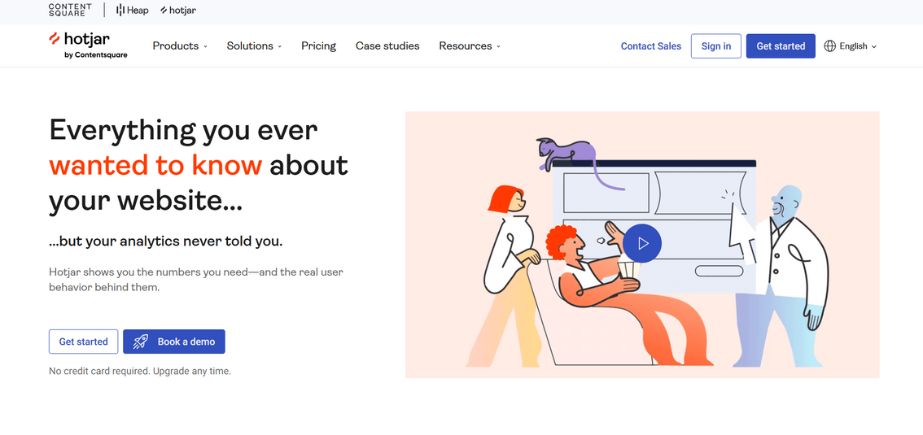
Rating: 4.2/5
Website: https://www.hotjar.com/
Best Use Cases: Website user experience analysis and behavioral insights
Hotjar aims to decipher user behavior by utilizing an in-depth website analytics and user experience research tool. The tool integrates visual heat maps, session recorder, and AI-driven feedback gathering in order to help companies gain deep insights about the behavior of their visitors on their websites. Recording capability in Hotjar indexes user activity (mouse, clicks, and scrolling) in real-time by allowing the possibility to replay it later to detect usability problems and ways to optimize them.
The artificial intelligence feedback pop-up system on the platform asks specific questions to visitors of websites, and the surveying feature allows the immediate verification of business concepts. The Engage tool enables one-on-one user interviews that are automatically recorded and transcribed, and, therefore, open the door to making qualitative research user-friendly and usable.
Key Features:
- Visual heatmap generation
- Session recording playback
- AI feedback collection
- Targeted survey deployment
- User interview tools
Pros:
- Intuitive visual analytics
- Real-time data collection
- Easy implementation process
Cons:
- Website-focused limitations
- Data privacy considerations
- Limited advanced analytics
Pricing: Freemium model with paid plans based on traffic volume and features
8. Crayon
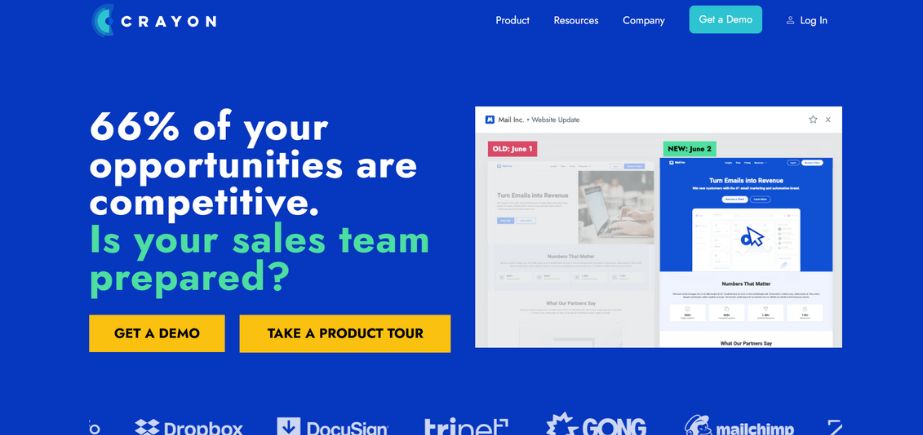
Rating: 4.1/5
Website: https://www.crayon.co/
Best Use Cases: Competitive intelligence gathering and market positioning analysis
Crayon has its focus on competitive intelligence through the use of artificial intelligence to keep track of and analyze a competitor’s actions across various channels. Competitive intelligence. Supported by an AI-enhanced analysis engine, the platform keeps a constant eye on the competitor websites, review sites, and industry publications to deliver real-time competitive intelligence.
With this automated method, the sales and marketing teams will be able to know about the activities of the competitors without having to carry out the task manually. The integration of CS sales battlecard provided by Crayon enables competitive intelligence to reach the sales process, so that lead generators can access updated data when communicating with customers. Its ability to integrate with tools such as Salesforce, HubSpot, and Slack allows competitive insights to be pulled into the current working environment, facilitating faster dissemination of capability to take action based on the intelligence.
Key Features:
- Multi-source intelligence gathering
- Automated competitor monitoring
- Sales battlecard integration
- Real-time alert system
- CRM platform connectivity
Pros:
- Comprehensive competitor coverage
- Real-time intelligence updates
- Seamless workflow integration
Cons:
- Narrow focus area
- Requires competitor identification
- Limited customization options
Pricing: Subscription-based pricing with tiers based on monitoring scope and features
9. Browse AI
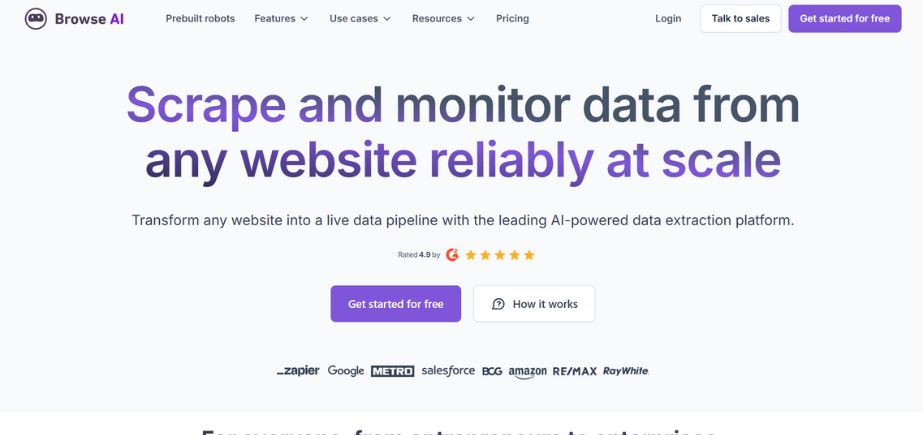
Rating: 4.0/5
Website: https://www.browse.ai/
Best Use Cases: Web data extraction and automated information monitoring. AI democratizes data extraction on the web since a person only needs no-code solutions to retrieve information on any site, without manual efforts. The system allows the use of readymade robots that will transfer the information into self-updating spreadsheets, and it is available to non-technical users.
This feature is especially useful to those market researchers who have to track certain information sources such as job advertisements, business directories, real estate markets, or product catalogs. The monitoring functionality of Browse AI notifies users of changes that affect them on websites tracked by the tool, so that they are up to date with developments in the market.
The solution provided through the browser extension offered through the platform does not require elaborate configuration measures, and users can start consuming valuable market data as soon as possible.
Key Features:
- No-code data extraction
- Automated website monitoring
- Pre-built extraction robots
- Browser extension interface
- Self-updating spreadsheets
Pros:
- User-friendly implementation
- No coding required
- Versatile data sources
Cons:
- Limited analysis capabilities
- Website dependency issues
- Basic visualization options
Pricing: Freemium model with usage-based pricing for advanced features
10. Appen
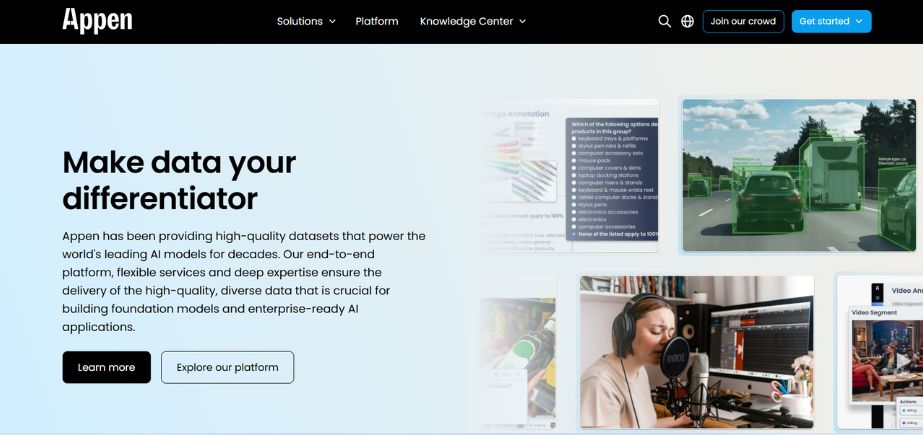
Rating: 3.9/5
Website: https://www.appen.com/
Best Use Cases: AI training data preparation and large-scale data annotation
Appen offers end-to-end data services that can enable AI to assist market research projects, including training data preparation, model testing, and massive data labelling services. The platform is beneficial to companies that create artificial intelligence models by offering them high-quality training data that trains the AI system to perform particular research tasks with high accuracy.
Data annotation offered by Appen includes a wide range of data, such as videos, images, audio files, and text feedback, which is why it is useful in assisting researchers who handle multimedia data. The text generation, text classification, and text translation, as well as language prediction services provided to the platform, include natural language processing.
Although it is possible that Appen does not directly give you research insights in the manner that the others do, it does happen to be the underlying database infrastructure that drives most avenues of AI research.
Key Features:
- AI training data provision
- Multi-format data annotation
- Natural language processing
- Model evaluation services
- Large-scale data handling
Pros:
- Comprehensive data services
- High-quality annotations
- Experienced team expertise
Cons:
- Indirect research application
- Complex project management
- Higher service costs
Pricing: Project-based pricing depending on data volume and annotation complexity
How to Choose the Right AI For Market Research
Choosing the best market research AI platform will involve all the factors you consider, using them carefully depending on the needs of the organization and what you want to accomplish in the market research goals, utilizing AI.
- Budget: Assessment of overall expenditure on ownership, such as subscriptions, costs of the implementation, training costs, and future requirements for support. When evaluating the platforms and pricing solutions, it is important to keep in mind immediate budget limitations and their plan to meet long-term financial commitments.
- Features: Evaluate fundamental functionality demand, including data incorporation capabilities and analytical tools, reporting alternatives, and automation degrees. Events being considered and evaluated should attach importance to features that directly answer the research questions you are facing at this point, as well as taking into account future growth opportunities and scalability in case of complex evaluation.
- Integration: Evaluate how compatible it is with the current business systems, customer relationship management system, data warehouse, and workflow tools. The ability to integrate seamlessly decreases the complexity of implementation, limits data silos, and results in a smooth adoption by different departments and groups of users within your organization.
- Support: Research offered support packages such as training, technical support, doc quality, and community-based packages. A good support framework accelerates user adoption, and low learning curves, and successful long-term usage on the platform to give maximum investment resources.
- Scalability: Regarding how the platform may deal with the increase in the volume of research, multiple users, new data sources, and changing data requirements. Select solutions that will be flexible enough to support the growth of the organization and meet changing research requirements without the necessity of full migration of the platform or substantial acquisition of additional investments.
Conclusion
Market research based on the integration of AI has completely turned the world of business on its head by taking a new perspective on consumer insights and market research. These intelligent platforms have an unrivaled potential in the processing, recognition, and prediction of the data that traditional research approaches merely do not possess.
Since it allows creating the entire survey automatically, from the real-time sentiment analysis, AI-powered research tools help organizations make better decisions based on a broad piece of market intelligence quickly. The mentioned platforms discussed in this course are the best artificial intelligence technology applications in market research, with all of them having their advantages and capacities in their own ways.
With the technology gradually advancing, businesses that adopt AI in market research will have vital competitive advantages in terms of better knowledge about the consumers and more efficient market plans.
Frequently Asked Questions
1. With regards to the traditional methods of conducting market research, what are the benefits of using AI?
AI supplements conventional research with automation of data gathering and removal of human bias, the ability to process more data at a time due to a higher rate of data processing, and the ability to predict things AI generates as predictive inputs cannot be performed with the same proportionate efficiency by manual analysis.
2. Which data can be analyzed using the possibilities of AI market research?
Such platforms can operate with text, audio, video, picture, social media, survey information, interaction with the internet, and numeric information captured across multiple sources.
3. Do AI market research tools work with small companies?
Most of these platforms provide scalable rates and freemium modeling so that AI research tools can be of use to small enterprises that have limited funds and research demands to large enterprises.
4. What is the accuracy of the market research findings that are AI-generated?
The contemporary AI research tools have the advantage of having a high level of accuracy due to machine learning algorithms; however, results are contingent on the quality of data, good implementation, and correct interpretation of the findings.
5. Will AI ever be able to do away with human market researchers altogether?
Though it automates much of the research, human knowledge is still required to develop strategic plans, make creative interpretations, understand the contexts, and convert research findings into business strategies that can work.
